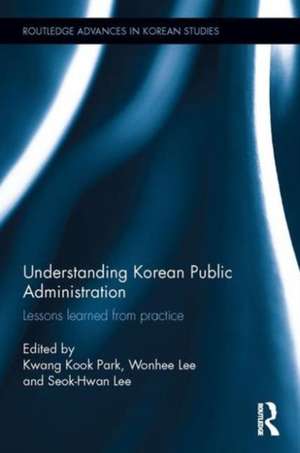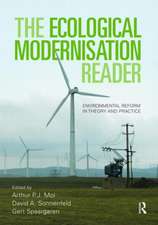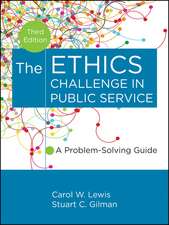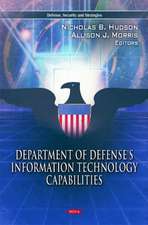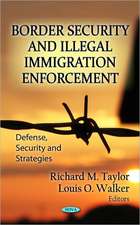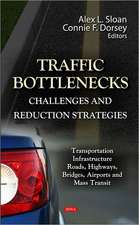Understanding Korean Public Administration: Lessons learned from practice: Routledge Advances in Korean Studies
Editat de Kwang-Kook Park, Wonhee Lee, Seok-Hwan Leeen Limba Engleză Hardback – 4 iul 2016
Each chapter covers historical contexts, key to understanding its public administration and an important aspect as Korea is a fast changing society. The book takes on a more pragmatic approach rather than to put the Korean experiences into the western theory. Each chapter therefore provides an extensive discussion on the lessons-learned and practical implications.
Din seria Routledge Advances in Korean Studies
-
 Preț: 326.49 lei
Preț: 326.49 lei -
 Preț: 310.08 lei
Preț: 310.08 lei - 18%
 Preț: 738.15 lei
Preț: 738.15 lei -
 Preț: 325.89 lei
Preț: 325.89 lei -
 Preț: 311.48 lei
Preț: 311.48 lei -
 Preț: 326.49 lei
Preț: 326.49 lei -
 Preț: 311.41 lei
Preț: 311.41 lei -
 Preț: 416.22 lei
Preț: 416.22 lei -
 Preț: 416.22 lei
Preț: 416.22 lei -
 Preț: 412.27 lei
Preț: 412.27 lei - 43%
 Preț: 188.46 lei
Preț: 188.46 lei - 18%
 Preț: 1214.92 lei
Preț: 1214.92 lei -
 Preț: 487.44 lei
Preț: 487.44 lei -
 Preț: 426.35 lei
Preț: 426.35 lei -
 Preț: 391.72 lei
Preț: 391.72 lei - 18%
 Preț: 1106.02 lei
Preț: 1106.02 lei - 26%
 Preț: 762.74 lei
Preț: 762.74 lei - 18%
 Preț: 1064.01 lei
Preț: 1064.01 lei -
 Preț: 436.14 lei
Preț: 436.14 lei -
 Preț: 416.22 lei
Preț: 416.22 lei - 18%
 Preț: 1006.07 lei
Preț: 1006.07 lei -
 Preț: 408.54 lei
Preț: 408.54 lei - 18%
 Preț: 1059.84 lei
Preț: 1059.84 lei -
 Preț: 413.33 lei
Preț: 413.33 lei - 25%
 Preț: 767.07 lei
Preț: 767.07 lei -
 Preț: 282.69 lei
Preț: 282.69 lei - 18%
 Preț: 1057.05 lei
Preț: 1057.05 lei -
 Preț: 461.57 lei
Preț: 461.57 lei -
 Preț: 449.41 lei
Preț: 449.41 lei - 18%
 Preț: 1056.00 lei
Preț: 1056.00 lei -
 Preț: 411.42 lei
Preț: 411.42 lei - 26%
 Preț: 764.20 lei
Preț: 764.20 lei - 26%
 Preț: 820.71 lei
Preț: 820.71 lei -
 Preț: 370.71 lei
Preț: 370.71 lei - 18%
 Preț: 1059.84 lei
Preț: 1059.84 lei -
 Preț: 409.48 lei
Preț: 409.48 lei
Preț: 1166.05 lei
Preț vechi: 1422.00 lei
-18% Nou
Puncte Express: 1749
Preț estimativ în valută:
223.15€ • 232.68$ • 185.46£
223.15€ • 232.68$ • 185.46£
Carte tipărită la comandă
Livrare economică 21 martie-04 aprilie
Preluare comenzi: 021 569.72.76
Specificații
ISBN-13: 9781138902596
ISBN-10: 1138902594
Pagini: 282
Ilustrații: 114
Dimensiuni: 156 x 234 x 23 mm
Greutate: 0.52 kg
Ediția:1
Editura: Taylor & Francis
Colecția Routledge
Seria Routledge Advances in Korean Studies
Locul publicării:Oxford, United Kingdom
ISBN-10: 1138902594
Pagini: 282
Ilustrații: 114
Dimensiuni: 156 x 234 x 23 mm
Greutate: 0.52 kg
Ediția:1
Editura: Taylor & Francis
Colecția Routledge
Seria Routledge Advances in Korean Studies
Locul publicării:Oxford, United Kingdom
Public țintă
Postgraduate and UndergraduateCuprins
1. Understanding Public Administration in Korea: The need for sharing models in government reforms, Kwang-Kook Park, Wonhee Lee, and Seok-Hwan Lee Part I. Role of Government 2. Evolution of the Developmental State and Government Capacity in Korea: Achievements and challenges, M. Jae Moon 3. The Role of Planning and Government in Economic Development, Jin Park 4. Korean Government Organization: The developmental state and its transformation, Keunsei Kim and Hyunshin Park Part II. Public Sector Management 5. Korean Public Personnel Management, Kyung-Ho Cho 6. Budget and Financial Management, Wonhee Lee 7. Performance Management in Korea: Prospects and challenges, Seok-Hwan Lee 8. Local Government, Young-Chool Choi 9. Roles and Reforms of Public Enterprises, Sang Cheoul Lee 10. Urban Development, Jong Youl Lee and Chad Anderson 11. Electronic Government, Seunghwan Myeong Part III. Accountability and Innovation 12. Administrative Control: Ensuring Accountable Bureaucracy, Sung-Jun Myung 13. Historical Review of the Anticorruption Policy in Korea: Progress and challenges, Kilkon Ko 14. Government Innovation, Kwang-Kook Park
Notă biografică
Kwang-Kook Park is Professor at the Department of Public Administration, the Catholic University of Korea. His research focuses on organizational theory, government innovation, and cultural policy. He served as the President of the Korean Association of Public Administration in 2013. He has been the President of Korea Environment Institute since 2014. He has published numerous articles that have appeared in the International Review of Public Administration, the Korean Public Administration Review, the Korean Policy Studies Review, and others.
Wonhee Lee is Professor of Public Administration and Public Policy at Hankyong National University and also Executive Director at the Research Center on State Owned Enterprise, Korea Institute of Public Finance.
Seok-Hwan Lee is Dean of the Graduate School of Public Administration and Professor of Public Administration and Public Policy at Kookmin University, Seoul, Korea where he specializes in public performance measurements and management.
Wonhee Lee is Professor of Public Administration and Public Policy at Hankyong National University and also Executive Director at the Research Center on State Owned Enterprise, Korea Institute of Public Finance.
Seok-Hwan Lee is Dean of the Graduate School of Public Administration and Professor of Public Administration and Public Policy at Kookmin University, Seoul, Korea where he specializes in public performance measurements and management.
Descriere
Although much has been written about the Korean public administration, most of it has been written in Korean. This book aims to provide more accessible knowledge internationally by filling that gap, covering both the history and the current status of the Korean public administration. Each chapter covers historical contexts, key to understanding its public administration and an important aspect as Korea is a fast changing society. The book takes on a more pragmatic approach rather than to put the Korean experiences into the western theory. Each chapter therefore provides an extensive discussion on the lessons-learned and practical implications.
